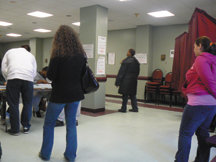After the county’s Board of Elections referred 190 “suspicious” ballots cast in a recent Hoboken election to the Hudson County Prosecutor’s office, that office forwarded them on Friday to the state Attorney General for review.
In the special Nov. 2 council election in Hoboken’s 4th Ward, incumbent Councilman Michael Lenz, an ally of Mayor Dawn Zimmer, lost to challenger Tim Occhipinti. In what has become characteristic of heated Hoboken elections, participants in the race have questioned the legitimacy of dozens of vote-by-mail ballots that were cast.
Occhipinti’s campaign had amassed a high number of those ballots before the election. Obtaining such ballots is a political strategy that has been employed in the past by many political groups in Hoboken, particularly in the 4th Ward, which contains dense senior citizen housing and public housing filled with voters.
“We don’t have a belief in the integrity of the voting system.” – Scott Siegel, Hoboken resident
________
On Friday, County Prosecutor Ed DeFazio said that after reviewing the information, his office will send the matter to the state Attorney General’s Office. DeFazio would not comment on specific reasons for forwarding the matter to them.
High number of ballots
What was surprising to some observers at the Wednesday meeting of the Board of Elections was the high number of ballots probed.
Councilman Ravi Bhalla, an ally of Lenz and legal counsel for the Lenz for Council campaign, has said previously that he believed only five ballots would be forwarded.
Board of Elections Clerk Michael Harper said that now, the investigation is out of their hands, and his office cannot comment any further. He has referred to the ballots as “suspicious.”
The ballots were forwarded under the authorization of Assistant Attorney General Donna Kelly.
Since Occhipinti also received more voting machine ballots than Lenz, it is not the outcome of the election that is in question. At issue is the integrity of the process.
Public speaks out to the Board of Elections
Resident Scott Siegel, a supporter of Lenz, said during the public portion of the Board of Elections meeting that he was glad the referrals were made. “We don’t have a belief in the integrity of the voting system,” Siegel said at the meeting.
Harper said that his board takes their job very seriously, and these incidents are not just about one election, but rather the entire system.
Councilman David Mello, another ally of Lenz and of Mayor Dawn Zimmer, said he questions the way the state’s vote-by-mail system is being used.
“People should certainly be able to vote by mail,” Mello said. “But if people are in a situation where they obviously had time on their hands to do other things, but they’re not choosing to go to the polling place, that should heighten the scrutiny.”
Mello specifically referred to people who were paid to work for the Occhipinti campaign and who voted by mail.
An Occhipinti official previously said that the campaign encourages people to vote by mail, which frees the worker or volunteer so they can help even more on Election Day.
Bhalla thanked the Board of Elections for taking the matter further and forwarding the ballots to the prosecutor’s office.
Stan Grossbard, the husband of Mayor Zimmer and an Election Day challenger, also spoke during the public portion of the meeting. He charged that 79 of the 80 campaign workers on the state 11-day ELEC filing put forth by the Occhipinti campaign were paid $40, and also voted by mail.
But resident Lane Bajardi, an Occhipinti supporter, pointed to “hypocrisy” in the room, alleging that the council members who spoke had also benefited from vote-by-mail ballots in the past. Bajardi also alleged that similar vote-by-mail campaigns were orchestrated by Zimmer’s team when she ran for council in 2007.
Bhalla said after the meeting that he found the actions of the Board of Elections to be a “very encouraging development.” He said the forwarding of ballots will allow law enforcement “to act as a fresh set of eyes” on the ballot controversy.
Of the approximately 450 vote-by-mail ballots cast in the race, 92 have already been rejected for issues such as signature problems. A portion of the 92 ballots could be included in the 190 that were referred to the prosecutor’s office.
The next steps…
How the attorney general will proceed from here is unclear. Bhalla was not able to provide a timeline, but said the issue will have to be addressed before the statute of limitations expires. The statute of limitations for election fraud is six years in New Jersey.
Grossbard submitted a “challenger affidavit” to the Board of Elections stating that residents came forward and testified they were paid $40 by members of the Occhipinti campaign to vote by mail. His affidavit also alleges that those who said they were paid to vote were also paid as “campaign workers” on ELEC filings.
Grossbard also alleges that two bearers of vote-by-mail ballots were paid $500 and $300, respectively.
An additional 105 individual ballots were challenged because the voters allegedly did not reside at the Hoboken Housing Authority dwelling listed on their vote-by-mail ballot.
Bhalla also delivered a challenger affidavit which alleged, using data from the United States Postal Service records, that six votes were cast by residents who no longer reside in the 4th Ward.
Councilman Tim Occhipinti said on Thursday, as he has said in the past, that he welcomes any investigation.
“I have every confidence in the process and I’m concentrating on doing what I was elected to do, serve the people of the 4th ward,” Occhipinti said in an e-mail.
Ray Smith can be reached at RSmith@hudsonreporter.com.
